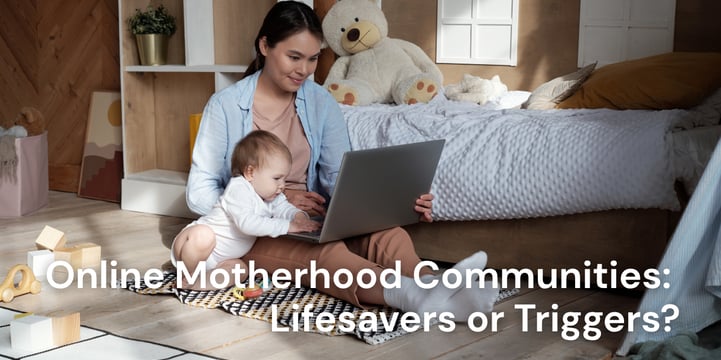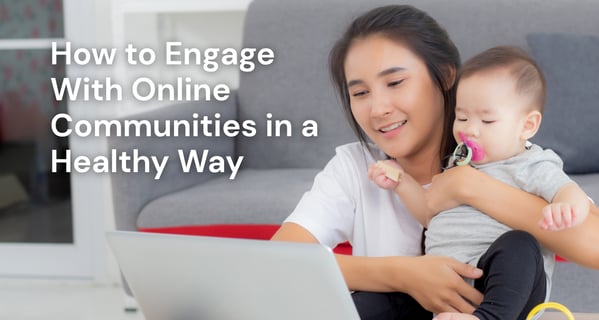Online Motherhood Communities: Lifesavers or Triggers?
7/2/20254 min read
For many new mothers, especially those facing the emotional weight of postpartum depression (PPD), the world can feel small and silent. In the midst of late-night feeds, hormonal crashes, and mental health struggles, online motherhood communities often become a lifeline - a place to be heard, validated, and reassured. But not every scroll is healing. For every moment of solidarity, there can be a sting of comparison, misinformation, or judgment.
So, the question arises: are online motherhood spaces lifesavers or triggers?
At Peace Temple, we regularly hear both sides of this story. Some mothers credit online groups for “keeping them sane,” while others say they left these platforms feeling worse than before. The truth is, online spaces can be both nourishing and harmful, depending on how they’re curated and consumed.
This article explores the double-edged nature of digital mothering spaces and how to engage with them in ways that protect your mental health.


The Rise of Digital Motherhood
Gone are the days when parenting advice came solely from family elders or baby books. Today, thousands of mothers gather online—in forums, private Facebook groups, Reddit threads, WhatsApp chats, and parenting apps—to share tips, vent frustrations, and form friendships.
These platforms offer:
Instant access to peer support
A sense of not being alone
Crowd-sourced solutions to everyday challenges
Validation for struggles that often go unspoken in real life
For mothers experiencing PPD, anxiety, or birth trauma, these online spaces can provide the first place they feel understood.
Why Online Communities Can Be Lifesavers
1. 24/7 Support and Availability
PPD doesn’t follow business hours. It often hits hardest in the quiet of night—when babies won’t settle, tears won’t stop, and partners may be asleep or unavailable. In these moments, a message from another mother halfway across the globe can feel like a lifeline.
Knowing someone else is awake, listening, and gets it helps chip away at the loneliness.
2. Validation Without Judgment
Many online groups offer what mothers struggle to find elsewhere: space to be honest. Posts like:
“I haven’t bonded with my baby yet—is that normal?”
“I yelled today and now I feel like a monster.”
“Breastfeeding is wrecking my mental health.”
…are often met with comments like “Same here,” or “You’re not a bad mom. You’re a tired one.”
At Peace Temple, we often recommend certain online spaces to mothers who feel isolated—especially if they lack in-person support or are in recovery from PPD.
3. Access to Resources and Encouragement to Seek Help
Many mothers first hear terms like “postpartum anxiety,” “rage,” or “birth trauma” from other mothers online, not healthcare providers. These platforms can empower women to identify what they’re feeling and realize: this isn’t just me—it’s a real condition, and I can get help.
When Online Spaces Become Triggers
Despite their potential for connection, not all online communities are created equal. Some can inadvertently worsen mental health by:
1. Fueling Comparison
Social media thrives on the highlight reel. Even in support groups, you’ll see:
Perfect nursery photos
Breastfeeding milestones
“I bounced back after 3 weeks!” posts
If you’re struggling to get out of bed or feel emotionally numb, these stories can feel like daggers. Comparison is the thief of joy—and online, it’s relentless.
2. Spreading Misinformation
Well-meaning mothers often share advice that lacks medical backing—especially around mental health, sleep training, or medications. This can lead to:
Confusion
Guilt
Delays in seeking professional care
Statements like “You just need to drink more water,” or “SSRIs will harm your baby” can scare struggling mothers away from legitimate treatment.
At Peace Temple, we encourage clients to cross-reference advice with healthcare professionals, especially when it concerns emotional wellbeing or baby safety.
3. Echo Chambers and Toxic Positivity
Some groups foster a “good vibes only” culture—where expressing anger, grief, or resentment is frowned upon. This creates a false sense of failure for mothers who aren’t enjoying every minute.
Other spaces may swing in the opposite direction—fueling cynicism, shaming different parenting choices, or encouraging emotional venting without offering solutions. Neither extreme supports true healing.


How to Engage With Online Communities in a Healthy Way
If you’re navigating PPD or other postpartum challenges, these guidelines can help protect your mental health online:
✅ Curate Your Feed
Unfollow accounts that make you feel inadequate, anxious, or judged. Instead, follow:
Mental health advocates
Evidence-based parenting pages
Accounts that show the messy, real side of motherhood
Your feed should reflect your truth, not someone else’s filtered narrative.
✅ Choose Moderated Support Groups
Look for groups run by therapists, doulas, or trained moderators. These spaces typically:
Enforce respectful dialogue
Monitor misinformation
Include mental health resources
Peace Temple’s virtual circles are one example of safe, therapist - led spaces for honest conversation.
✅ Set Boundaries Around Screen Time
Scrolling can become addictive especially during anxious spirals or insomnia. Consider:
Time limits on apps
Scheduling “phone-free” zones in your day
Turning off notifications for emotionally intense threads
Boundaries with your device are boundaries for your brain.
✅ Listen to Your Body’s Cues
After scrolling, ask yourself:
Do I feel more seen or more alone?
Am I informed or overwhelmed?
Do I feel judged or understood?
If your body tenses or your chest tightens, it may be time to log off and ground yourself in the real world.
What If You Feel Triggered But Still Want Community?
You don’t have to abandon online spaces completely. Try:
Posting anonymously if vulnerability feels scary
Journaling before and after online interactions to process what came up
Joining small, private groups where quality outweighs quantity
And remember, the most healing support often comes from small, intentional connections not massive comment threads.
Final Thoughts: Online Support Is a Tool - Not a Replacement
Online motherhood communities are not inherently good or bad. Like any tool, their impact depends on how they’re used. For some mothers, they’re a lifeline in the dark. For others, they’re a source of subtle emotional harm.
What matters most is your emotional safety.
At Peace Temple, we believe in digital spaces that offer not just information but compassion, safety, and validation. If your current online experience isn't serving your healing, it’s okay to walk away and seek connection elsewhere.
You don’t have to be everywhere. You just have to be somewhere safe.
